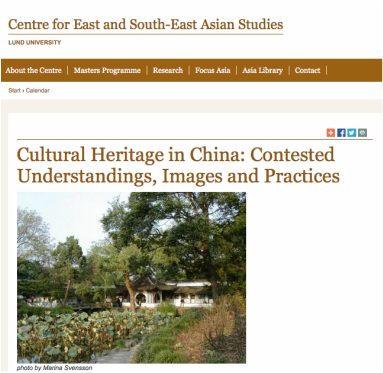|
Travis Klingberg (U Colorado Boulder) has written an insightful review of my book, A Landscape of Travel, for the journal Pacific Affairs. In his review, he notes how my book extends and updates much of the earlier scholarship on ethnicity and tourism in China, as well as presenting new arguments on the intersections of mobility and development in rural China. Klingberg writes, "In highlighting the role of migrant subjectivities and labor, Chio has at the same time helped clarify the relationship between migration and tourism in China. The rediscovery of rural and remote China by urban Chinese has been a significant social and political change over the past two decades in China. This is a question that I have pursued in my own work. But mobilities of leisure and labour don’t map cleanly onto the schematic movement of urban tourists to rural China and rural labourers to urban China, and A Landscape of Travel is a valuable study of how closely related these mobilities are." Additionally, he also points out important comparative, future work that needs to be done on tourism in China -- in non-ethnic minority regions, for example, and also in the discursive deployment of "green" urbanization project or "ruralizing" urban spaces.
A preliminary version of the review is now available online and will be in the print version of the journal in a future issue. A PDF of the online version is also available here to download. I'm grateful for the time and attention to my work by Klingberg, and of course it's exciting to see my work being situated more deeply in the (relatively) small field of China tourism studies as well as across disciplinary perspectives.  In a few weeks, I'm headed to Lund University, Sweden, for a conference on cultural heritage in contemporary China, organized by Marina Svensson at Lund University. I'm contributing a paper on bullfighting in Guizhou (and Yunnan) to this event, and it's a challenge for me to think about this part of my research in the context of cultural heritage discourses as they circulate in and through China today. Clearly bullfighting has become emblematic of certain communities in rural ethnic China, and there is a lot of pride -- and money -- invested in promoting bullfighting as a unique, local practice. How these fights, as planned events and as moments of chaotic pleasure and entertainment for the audiences (as well as income for the organizers and owners), speak to subjective senses of ethnic difference and communitas, as well as to social-structural ambitions for recognition and rewards in China's ethnic tourism industry will be the focus of my presentation. For a few photos of bull-fighting stadiums and other related phenomena, see my post from July 2014 . |
Archives
April 2024
|